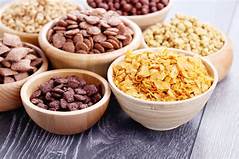Importance of well balance diet
All food contains all of the nutrients we need to be healthy, it is necessary to eat various foods in sufficient amounts. A good diet will include many different foods, and sufficient in quantity and quality to meet an individual’s need for food energy and other micro nutrients.
PEARS
Typical serving size:
1 medium pear (59 oz or 166 g)
HOW THEY HARM
Allergies
Tooth decay (dried pears)WHAT THEY HEAL
High cholesterol Constipation High blood pressure Diabetes Called the “butter fruit” by many Europeans because of its smooth texture, a pear makes an ideal snack, dessert, or even a sweet or spicy side dishPears are a delicious treat when served fresh, but they can also be baked, poached, or sautéed
One medium pear has about 100 calories and provides about 6 g of fiber
Canned pears lose most of their vitamin C due to the combined effect of peeling and heating
They are also higher in calories, especially if they are packed in heavy syrup
There are about a dozen common varieties of pears—such as Bartlett, Anjou, and Bosc—and they have similar nutritional values
Health Benefits
Lowers cholesterol levelsPears are loaded with several types of fiber, including pectin, a soluble fiber that helps control blood cholesterol levels
Relieves constipation
Cellulose in pears, an insoluble fiber, is also known as a bulk-forming fiber and has a mild laxative effect, helping to promote normal bowel function
Helps lower blood pressure
Loaded with potassium, pears can help keep blood pressure under control
May lower diabetes risk
Pears are a good source of antioxidants, and that may be especially important for people concerned about type 2 diabetes
According to a 2012 Harvard study, eating anthocyanin-rich foods such as pears more than five times a week was associated with a lower risk of developing type 2 diabetes
Pears also have a low glycemic index and load, which is helpful for people with diabetes
Health Risks
Allergic reactionsWhile fresh pears rarely cause allergic reactions, dried pears often contain sulfites, which can provoke asthma attacks or allergic reactions in susceptible people
Tooth decay
Dried pears provide a more concentrated form of calories and nutrients than fresh pears; their high sugar content and sticky texture may promote tooth decay




